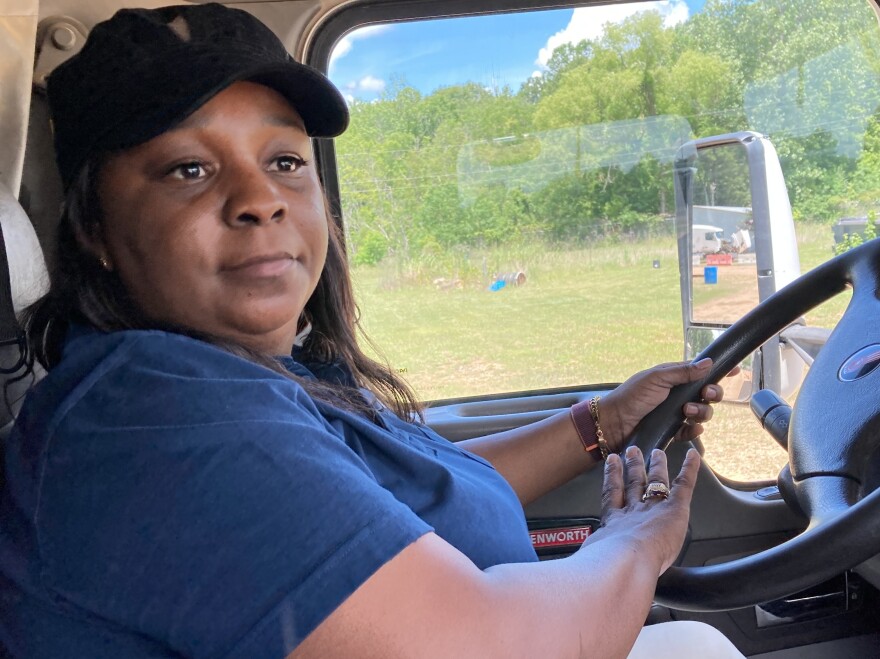Driving trucks has historically been a male-driven profession, but if Pamela Williams has her way, that will soon change.
"Guys, you better watch out, 'cause this right here is a women's industry from now on," says Williams, a truck driver and instructor with DSC Training Academy in Jackson, Mississippi.
Williams is one of a record number of women who are hitting the road as strong demand for everything from iPads to cars has led to a skyrocketing demand for drivers to transport the goods.
At the same time, many of the men who traditionally held truck driving jobs have yet to return, leading to a severe shortage of drivers across the industry.
That has opened up opportunities for women, who were disproportionately hit by layoffs during the pandemic, especially in restaurants and service sector jobs.

Pay in the truck driving industry has risen nearly 5% in the last year to an average of more than $27.50 per hour, according to data from the Labor Department.
That's higher than what many women made in service jobs, making trucking a more attractive professional path. The higher pay and the chance to see the country from the cabin of a truck is what attracted Williams to the industry.
She's now been driving for seven years and she's also teaching others how to drive trucks.
"I can go out here and drive a week and make a thousand dollars – a quick thousand dollars doing something that I like to do," Williams says. "That's good."
Sleeping in cots and dealing with blood clots
Still, trucking can be a rough job.
Driving trucks often mean sleeping in a cot behind the front seat. All those hours of sitting behind the wheel can lead to blood clots. Plus driving around a 70-foot-long vehicle is one of the most dangerous jobs in the country, according to data on injuries, illnesses and fatalities from the Labor Department.
For women there are additional challenges.
While sexism from the male truckers has improved over the last decade, it hasn't gone away.
The trucking industry is still dominated by men, who accounted for more than 83% of driving jobs in June, according to the job site ZipRecruiter, though there are about 245,000 more women driving currently, the highest ever.
Before signing up for classes at DSC Training Academy, Amalya Livingston did everything from working call centers to freelance mechanic work on cars to taking photos of them for dealerships.
She left those jobs for trucking to get away from always having a manager looking over her shoulder.
Livingston says some men still give her smirks or side-eyes when she climbs out of the cabin at refueling stops.
But it doesn't bother Livingston, who was inspired to join the trucking industry by her mother, who was herself a driver.
"It comes with the territory," Livingston says. "Women who make history," she adds, "We're not complacent."
Possibly, the biggest barrier for women is the time away from the people they care for. Research has shown women are more likely to be caretakers in the family, and many mothers continue to struggle with child care options.

Why women drive trucks
But more and more women are making it work.
Tiffany Hathorn initially dismissed the idea of trucking. She had other jobs and even tried to start her own business. She also had two younger sons who would need to be taken care of, making it hard to be on the road.
But Hathorn says she kept hitting a financial ceiling and she felt she was never making enough money for her family. It was Hathorn's mother who finally convinced her to join by volunteering to take care of the two sons.
Today, Hathorn is a truck driver, and she's on track to make $70,000 for the year. She orders groceries from her phone while on the road, and she video chats with her two sons and her loved ones when she can.
So when Hathorn gets asked by women and men whether trucking is right for them, she tells them the good and the bad. But she always tells them to do it, not least because of the financial freedom it has provided her.
"I'm not struggling like I was before," she says. "I have more of a peace of mind now."

Williams, the instructor at DSC Training who's been driving for seven years, sees the initial hesitancy all the time.
When her students first climb into a truck — men and women — many get intimidated.
Everything is bigger — the mirrors, the wheel and even the gearbox, since most students have never driven a stick shift.
But once they turn the key, change gears and feel the subtle shift in the engine's rumble, the atmosphere transforms.
"They feel the power, then everything changes," Williams says. "They're like 'Oh, oh I'm gonna be a truck driver!'
This story was produced by the Gulf States Newsroom, a collaboration between Mississippi Public Broadcasting, WBHM in Birmingham, Alabama, WWNO in New Orleans and NPR.
Copyright 2024 NPR. To see more, visit https://www.npr.org.




